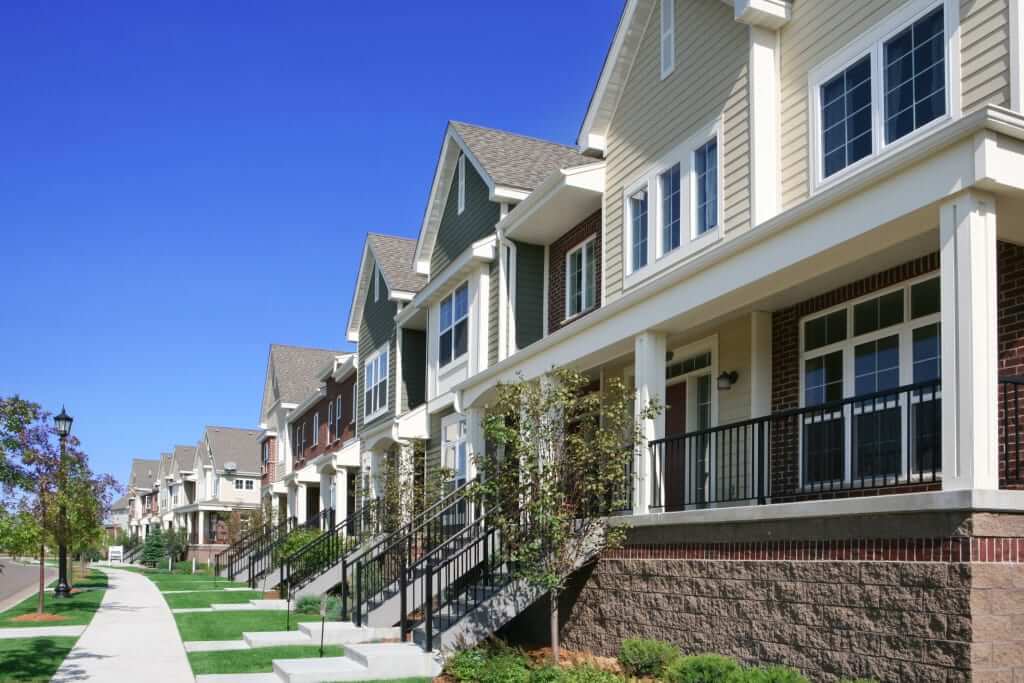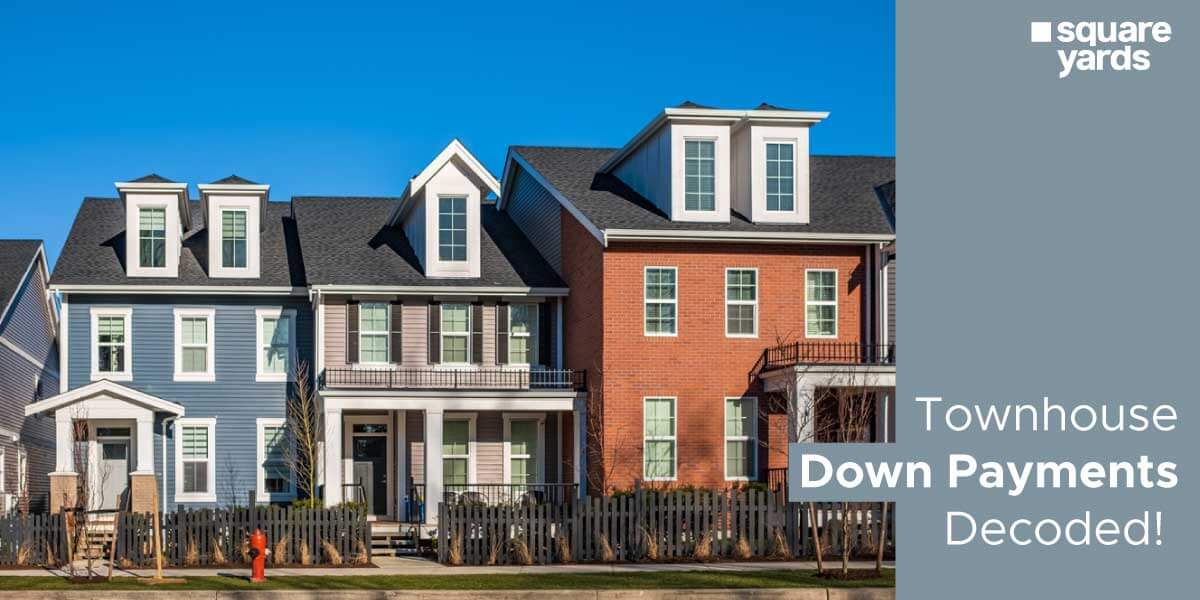Embarking on the journey to homeownership in Canada? Let us unravel the ins and outs of townhouse down payment across the country! We’ll glide through the nuances of down payments, the true north’s golden ticket to your very own townhouse. From the Atlantic to the Pacific and every province in between, we dissect the variations in townhouse down payment. Our analysis aims to simplify the complexities, ensuring you’re equipped with the knowledge to make informed decisions. This exploration encompasses Canada’s diverse real estate landscapes, shedding light on the specific requirements and trends associated with townhouse down payment. Join us on this journey as we break down the intricacies, providing a professional and straightforward guide to Townhouse Down Payments Across Canada.
Decoding Townhouses

In Canada, when people mention townhouses or townhomes, they refer to single-family homes that cosy up to their neighbours in a purpose-built complex. These homes share walls but stand independently, unlike semi-detached houses or rowhouses. While they’re all wall-sharing buddies, townhouses are the unique ones with legal and financial ties to their neighbours.
-
Freehold Townhouse:
This is like owning a regular single-family house – they’re in charge of everything, from the roof to the plumbing. It’s their kingdom, and they rule it all.
-
Condominium Townhouse:
Here, owners own a piece of the condo corporation, not the land. Monthly maintenance fees cover shared amenities and pesky details like water and garbage. Plus, there’s a reserve fund for complex renovations, so they can focus on their castle’s interior.
-
Stacked Townhouse:
It’s like townhouses playing Jenga! Stacked townhouses have two or more levels, each owned individually. One might own the basement and main level, while the upstairs is a separate realm. Each unit has its entrance – it’s like having their townhouse skyscraper.
Striking the Balance: Townhouse Living in the GTA
Aspiring homeowners in the Greater Toronto Area (GTA) can find a compelling equilibrium where affordability coexists with comfort in the world of townhouse living. This unique housing option is strategically positioned between the opulence of single-family residences and the compact allure of condominium apartments. Townhouses emerge as a pragmatic compromise, offering a nuanced fusion of cost-effectiveness and expansive living spaces. In this urban array, they become not just dwellings but the epitome of a well-calibrated lifestyle, catering to those who seek the perfect blend of financial prudence and a gracious living experience.
Townhouse Investment Insights Keeping the Financial Landscape in Mind
Diving into the fiscal world, townhouses are astute investments, offering a prudent compromise between financial prudence and lifestyle enhancement. As of July 2020, statistical revelations shed light on the advantageous positioning of condominium townhomes in Toronto, standing at a substantial 53% and 39% less expensive than detached and semi-detached homes, respectively. Here’s a nuanced exploration of average prices across key communities:
|
Region |
Prices |
|
Toronto |
$724,655 |
|
Mississauga |
$647,618 |
|
Oakville |
$655,453 |
|
York Region |
$702,729 |
|
Durham Region |
$494,669 |
|
Burlington |
$651,282 |
For those venturing into freehold townhome territory, a distinctive financial landscape unfolds, reflecting ownership of both house and land:
|
Region |
Prices |
|
Toronto |
$1,080,388 |
|
Mississauga |
$796,926 |
|
Oakville |
$725,636 |
|
York Region |
$858,267 |
|
Durham Region |
$627,122 |
|
Burlington |
$751,830 |
(Note: The provided statistics include freehold towns, attached houses, and rowhouses, as reported by the Toronto Regional Real Estate Board.)
Navigating Closing Costs

The exciting journey of owning your home involves more than just the initial purchase price. It’s crucial to carefully consider the additional expenses known as closing costs. These include elements like the Ontario Land Transfer Tax, and if you’re buying in Toronto, the Toronto Land Transfer Tax also comes into play. Additionally, you’ll need to budget for legal fees. Understanding and planning for these closing costs is essential for a smooth and informed transition into homeownership. So, as you set out on this adventure, be sure to factor in these aspects to ensure a well-prepared and enjoyable home-buying experience.
Monthly Essentials for Townhouse Owners
Becoming a townhouse owner involves embracing a diverse range of ongoing financial responsibilities. This encompasses essential aspects such as obtaining home insurance to safeguard your property, fulfilling property tax obligations, managing maintenance fees (especially applicable for condo towns), staying on top of utility payments, and addressing water, garbage, and sewage expenses (relevant for freeholds). Achieving a successful and sustainable homeownership journey requires a thorough and comprehensive understanding of these monthly essentials. So, whether it’s protecting your investment or maintaining the overall functionality of your home, being well-informed about these financial aspects is key to ensuring a smooth and enjoyable experience as a townhouse owner.
Evaluating the Advantages and Disadvantages of Townhouse Living
Some of the advantages and disadvantages of owning a townhouse have been tabulated below for your convenience:
|
Advantages |
Disadvantages |
|
Townhouses carve a niche as more economical housing options compared to traditional houses. |
Middle units in stacked townhouses may share walls with neighbours above, below, and on either side. Prospective buyers should scrutinise noise transfer and soundproofing before committing. |
|
Enjoying the perks of shared amenities without the hefty condo apartment fees. |
Condo townhouses are subject to rules and bylaws, influencing aspects like window covering colours, balcony or terrace usage, and pet ownership limitations. |
|
Townhomes in Toronto are strategically situated in desirable residential neighbourhoods, often near schools and essential amenities. |
Certain alterations, such as installing solar panels or a metal roof, might be restricted to maintain the cohesive appearance of the complex and uphold property values. |
|
The condo corporation typically handles shared maintenance tasks, such as snow removal, furnace maintenance, and gardening in communal areas. |
While townhouse maintenance fees are generally lower than those for condominium apartments, they still constitute a recurring monthly cost that homeowners must account for. |
|
Townhouses in the GTA tend to offer more room than their condominium apartment counterparts. |
Due to their vertical nature, townhouses often feature multiple stories, translating to the presence of numerous staircases. Prospective buyers should consider their preferences and lifestyle suitability concerning properties with three or four floors. |
|
Several townhouse complexes in the GTA implement security measures, including nighttime security guards. |
Simple Tips for a Smart Townhouse Purchase
Here are some key things to remember when buying a townhouse:
-
- Consider Location: The location of your townhouse within the complex can affect the price and your overall satisfaction. Pay attention to nearby amenities and surroundings.
- Listen and Observe: During your house hunt, listen for noises from other units and observe the activity in shared spaces.
- Check Parking: Take a good look at your parking space, especially if it’s in a shared garage.
- Home Inspection Matters: Consider a home inspection if you’re buying a freehold or an older condo townhouse. This is crucial for understanding the condition of systems like the furnace and air conditioning.
- Review Status Certificate: Have your lawyer review the status certificate for condo townhouses. It reveals the financial and legal health of the corporation, helping you anticipate maintenance fees.
- Understand Rules and By-Laws: Read and understand the rules and by-laws to be aware of any restrictions or expectations.
- Check for Kitec Plumbing: If the townhouse was built between 1995 and 2007, inquire about Kitec plumbing. It might need replacement if present.
- Evaluate Comparable Units: Assess the value of the townhouse by looking at recently sold units nearby. Consider factors like unit differences and prime locations within the complex.
- Quality Varies: Not all townhouses are the same in terms of quality and workmanship. Do thorough research and work with a Realtor familiar with the complexes you’re interested in.
Shifting Real Estate Landscape Across Canada
Real estate conditions in Canada are undergoing significant changes. While some markets like Calgary remain in high demand and relatively affordable, others, particularly Toronto, are experiencing a downturn, with transactions expected to reach a 20-year low. Nationally, home prices have seen a monthly decline of 1.2%, dropping to $741,400 in September. Despite the decrease, prices remain higher than they were five years ago, reflecting the complex impact of the pandemic and recent interest rate hikes on the real estate landscape.
Townhouse Affordability Amidst Changing Market Conditions
Zoocasa conducted a study comparing the required townhouse down payment for purchasing a townhouse at the benchmark price in 19 cities across the country. The analysis focused on differences in down payments between September 2018 and September 2023, providing insights into how market dynamics influence potential home buyers.
Regional Variations in Down Payment Requirements
Examining the data, most cities experienced modest increases in required down payments, with the majority seeing growth of less than $20,000. Six cities even had increases below $5,000, underscoring Canada’s real estate market’s diverse nature of price growth. Regina stood out with the smallest change in down payment cost, while Greater Vancouver witnessed a six-figure increase, primarily driven by a 20% down payment requirement for homes exceeding $1 million.
Notable Cities with Down Payment Changes
Breaking down the data further, only a few cities displayed significant shifts in minimum down payment requirements. Greater Vancouver, in particular, saw a substantial jump of $162,730, emphasising the impact of the 20% down payment rule for homes surpassing $1 million. Other cities with notable increases include Victoria, Fraser Valley, Toronto, Kitchener-Waterloo, and Hamilton-Burlington, where required down payments rose by over $20,000 in the past five years.
Conclusion
As the Canadian real estate landscape undergoes transformations, the analysis of townhouse affordability reveals a more complex picture. While many cities experienced moderate increases in required down payments, some witnessed significant shifts, notably Greater Vancouver, with a six-figure jump. The findings underscore the dynamic nature of regional markets and the impact of specific regulations, such as the 20% down payment requirement in certain areas. Understanding the local context becomes paramount as potential home buyers navigate these changes. Despite challenges, the evolving market conditions offer opportunities for those seeking to enter the real estate arena, especially in regions where affordability sees positive trends.
You May Also Read
|
Explore Small And Large Condo |
|
|
How To Invest in Single Family Homes |
|
|
Canadian Home Staging |
|
|
Explore Waterfront Properties Investment |
Frequently Asked Questions (FAQs)
Are townhouses more affordable than houses?
Yes, townhouses are often more affordable than traditional houses, striking a balance between cost and space in real estate.
How much does a townhouse cost?
Townhouse prices vary but are generally lower than detached houses. Prices depend on location, size, and local real estate trends.
Is a townhouse right for you?
If you seek affordability, low maintenance, and communal amenities, a townhouse could be a perfect fit for your lifestyle and budget.
What is the disadvantage of living in a townhouse?
Potential disadvantages include proximity to neighbours, adherence to rules, and monthly maintenance fees, factors to consider when choosing townhouse living.
Are townhouse walls soundproof?
Soundproofing varies, but townhouse walls may not offer complete insulation. Consider noise factors and inquire about insulation during the home-buying process.



































